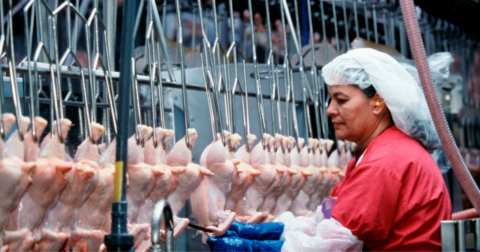Investigation
Industry Groups Worked to Expand Wisconsin Bill Meant for Small Dairies
Factory Farms•7 min read
Feature
Justin Ransom helped launch Tyson’s controversial label for “climate friendly” beef. Now he leads the federal agency charged with meat label oversight.


Words by Grey Moran
On July 3rd, Secretary of Agriculture Brooke Rollins announced a new round of political appointments to the U.S. Department of Agriculture. Among them, Justin Ransom was named the administrator of the Food Safety and Inspection Service (FSIS), the agency charged with overseeing the safety of the U.S. meat and poultry supply. Up until his appointment, Ransom held a senior leadership role at Tyson, where he played a key part in launching the company’s highly contested “climate-friendly” beef brand called Brazen Beef, a brand that has been pulled from the shelves and accused of misleading consumers with its empty climate claims.
While an executive branch appointee is permitted to work for an agency that regulates a former employer, Kedric Payne, who leads the ethics program at the Campaign Legal Center, tells Sentient, “there is a potential for ethics violations if the official does not recuse from decisions that could be conflict of interest with Tyson.”
Part of Ransom’s role at FSIS involves overseeing claims on food labels, including those related to climate, human health and animal welfare. Whenever Tyson, the largest meat producer in the U.S., releases a new product or modifies its packaging, it must obtain FSIS’s approval for the label — a requirement that could raise a conflict of interest.
Ransom also previously held top positions at McDonald’s and OSI Group, a meat supplier that services many of the largest food brands that also fall under FSIS’s purview. “The appointment of Justin Ransom, a food industry insider who has spent years trying to weaken food safety requirements on behalf of paying clients such as Tyson’s, to head the food safety program at the Department of Agriculture poses a conflict of interest,” Craig Holman, an expert in governmental ethics at Public Citizen, tells Sentient.
The Food Safety and Inspection Service (FSIS) is tasked with “protecting the public’s health by ensuring the safety of meat, poultry, and egg products,” according to the agency’s website. This involves enforcing bedrock public health and consumer safety laws, including the 1906 Federal Meat Inspection Act that established sanitation standards for meatpacking facilities, mandating inspections of all meat sold in the United States. FSIS also has the unique authority of approval of all meat, poultry and egg product labels on the front and back of packages.
Carrie Apfel, the deputy managing attorney at the public interest law firm Earthjustice, expressed concern about the possibility of Tyson seeking approval from the FSIS for additional labels with unsubstantiated claims about its meat products.
“When you have an insider from the second largest meat company at the helm of that agency,” she says, “it’s a bit of a fox guarding the hen house situation.”
In 2022, under Ransom’s leadership, Tyson applied for a label on its Brazen Beef brand claiming that its production achieves a “10 percent greenhouse gas reduction,” which FSIS quickly approved. The approval drew criticism from environmental groups that accused the federal agency of “rubberstamping” a misleading label. The Environmental Working Group (EWG) petitioned the USDA to prohibit this label, arguing that the claim about climate was not based on any third-party verified data and peddles false information to consumers.
One third of all greenhouse gas emissions are fueled by global food systems, and research shows beef is far worse for climate emissions than any other food, no matter how that beef is produced.
“There is no such thing as low-carbon beef. No food choice results in more greenhouse gas emissions than beef,” stated EWG in its petition to the USDA. “However, many consumers viewing the Low-Carbon Beef label approved by USDA are likely to assume that beef bearing such a label will help reduce greenhouse gas emissions.”
In September of 2024, EWG sued Tyson, alleging that the climate claims related to the Brazen Beef brand were misleading marketing. EWG is represented by Apfel at Earthjustice, among other lawyers, and the case is still pending. As part of the pre-trial discovery process, attorneys have a chance to ask for documents and question witnesses. Earthjustice plans to question Ransom under oath as “one of the witnesses who we intend to depose in our lawsuit,” wrote Apfel in an email to Sentient. The lawsuit challenges both Tyson’s claim of producing beef with lower emissions and working toward ‘net zero emissions.’”
“It’s just impossible for a meat company the size and scale of Tyson — with the production the scale of Tyson — to actually achieve the things that it says that it can achieve while making virtually no significant changes to its business model,” says Apfel of Tyson’s net zero targets. “Tyson never has and cannot possibly substantiate those claims.”
Ransom’s role at Tyson as the senior director for sustainable food strategy was often public-facing, helping to market Tyson’s climate strategy. This included joining the podcast Marketing Talk to discuss the launch of the Brazen Beef program in 2023. “We believe agriculture and beef production specifically can be part of the climate solution, and it’s really about how do we characterize it as such,” Ransom said on the podcast. He described Brazen Beef’s origins as “a bit of a leap of faith backed by data.”
The appointment of a former Tyson leader to the head of FSIS could pose broader conflicts of interest when it comes to regulating the U.S. meat supply in the public interest. As the largest meat company in the U.S., Tyson has frequently fallen under the agency’s scrutiny. For instance, the agency has suspended some of Tyson’s slaughterhouses for failing to meet the very minimal standards for reducing animal cruelty outlined in the Humane Methods of Slaughter Act and the Federal Meat Inspection Act.
As of late 2024, Tyson was under investigation by FSIS’s Packers and Stockyard Division, the office responsible for protecting livestock and poultry producers from “unfair, unjustly discriminatory or deceptive practices.” In December, Investigate Midwest found that there were 18,000 records pertaining to an active investigation into “the business practices of Tyson Foods and its contract growers,” which the USDA didn’t confirm.
FSIS didn’t respond to Sentient’s request to confirm whether this investigation remains ongoing, or requests about the conflicts of interests posed by Ransom’s appointment. Ransom did not respond to a request for comment.
Ransom is the latest example of the Trump Administration’s long pattern of political appointments with potential conflicts of interest and close industry ties across the executive branch. However, the practice of appointing USDA officials with industry ties is not unique to Trump or Republicans. Former President Biden’s appointment of Tom Vilsack to USDA Secretary (a position he also held under former President Obama) drew significant criticism at the time, as Vilsack had led a dairy industry trade group for the four years following Obama’s second term.
There are no ethics rules that explicitly restrict Ransom’s appointment to the helm of an agency overseeing his recent employer, says Holman. “Trump explicitly repealed Biden’s ethics executive order regulating conflicts of interest and replaced it with nothing.” As a result, there are also “very little restrictions on what Justin Ransom can and cannot do under the conflict of interest code” in his new appointment.
In an email to Sentient, Anna Kelly, White House Deputy Press Secretary wrote that “Justin Ransom has two decades of experience in agriculture and food systems, and he is exceptionally qualified to lead FSIS. All administration officials abide by robust ethics requirements to avoid conflicts of interest.”
“This administration is the first in well over a decade to abandon conflict of interest regulations in the appointment of senior administration officials,” wrote Holman in an e-mail to Sentient. During Trump’s first presidential term, the administration issued ethics rules during the first month, but was subsequently found to have violated its own rules in numerous political appointments, according to an annual report issued by the Office of Government Ethics.
There are federal laws governing conflicts of interests that could limit Ransom’s direct involvement in matters regarding Tyson, notes Payne of the Campaign Legal Center. He points to 18 U.S. Code § 208, a federal law prohibiting executive branch employees from “participating personally and substantially in a particular Government matter that will affect his own, as well as the financial interests of certain individuals with whom he has ties outside the Government.” Payne also pointed to the regulations requiring that executive branch employees seek approval for situations involving personal or business connections.
“To determine whether or not there is the need for recusal, there’s a pre-approval process,” says Payne, in which the agency ethics official should get “details from the official about the interactions with that former employer.”
Payne is concerned, however, that these rules may not be enforced, citing a culture where those that try to enforce the rules may be fired. Payne points to the recent firing of Joseph Tirrell, the ethics chief at the Department of Justice, whose dismissal appears to be a retaliatory move. “In this situation,” says Payne, “there may not be any guardrails to stop improper conduct.”